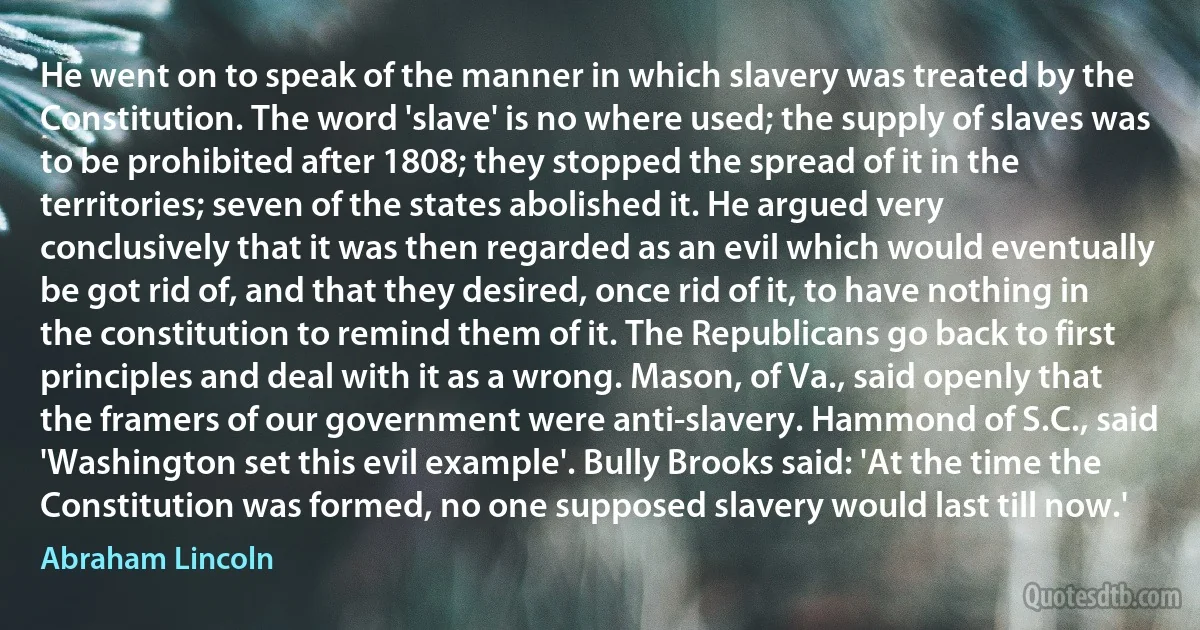
He went on to speak of the manner in which slavery was treated by the Constitution. The word 'slave' is no where used; the supply of slaves was to be prohibited after 1808; they stopped the spread of it in the territories; seven of the states abolished it. He argued very conclusively that it was then regarded as an evil which would eventually be got rid of, and that they desired, once rid of it, to have nothing in the constitution to remind them of it. The Republicans go back to first principles and deal with it as a wrong. Mason, of Va., said openly that the framers of our government were anti-slavery. Hammond of S.C., said 'Washington set this evil example'. Bully Brooks said: 'At the time the Constitution was formed, no one supposed slavery would last till now.'
Abraham LincolnRelated topics
deal evil example went government last nothing now once rid say set seven slave speak spread stop till time word wrong washington framers hammond statesRelated quotes
A genuine first-hand religious experience like this is bound to be a heterodoxy to its witnesses, the prophet appearing as a mere lonely madman. If his doctrine prove contagious enough to spread to any others, it becomes a definite and labeled heresy. But if it then still prove contagious enough to triumph over persecution, it becomes itself an orthodoxy; and when a religion has become an orthodoxy, its day of inwardness is over: the spring is dry; the faithful live at second hand exclusively and stone the prophets in their turn. The new church, in spite of whatever human goodness it may foster, can be henceforth counted on as a staunch ally in every attempt to stifle the spontaneous religious spirit, and to stop all later bubblings of the fountain from which in purer days it drew its own supply of inspiration.

William James
Now, so far as we may ascribe any great historic result to a single cause, it is the cotton-gin which has thwarted the Constitution and defeated the expectation of our fathers. The cotton-gin - which in seven years saw a crop twenty times as large as before; the cotton-gin, which enabled a man to pick a thousand pounds of cotton in a day instead of one pound - has seemed also to pick the moral perceptions out of the minds of a great many sober and kindly people; to pick all the intention, the spirit, the humanity, the meaning, the very soul, out of the Constitution of the United States, making it not the charter of equal freedom to all who are subject to it, but a mere commercial band by which a part of the population are compelled, directly or indirectly, to hold another part in slavery.

George William Curtis
Mr. Douglas incessantly remembers to inform us in every speech he has made for a year past that, when the Constitution was formed, all the thirteen States but one recognized slavery by law; but he incessantly forgets to add that Pennsylvania in 1780 passed an act for the gradual abolition of slavery which freed everybody born in the State after its passage; that one day later Massachusetts decided that her Bill of Rights abolished slavery forever; that in 1784 Connecticut followed Pennsylvania, and Rhode Island at about the same time; that in 1792, soon after the Constitution was formed. New Hampshire, under her Bill of Rights, Vermont, by express assertion in her Constitution, New York in March, 1799, and New Jersey in 1804, gradually abolished slavery.

George William Curtis
Freedom means free speech, not politically correct safe spaces. Freedom means religious freedom, whether you are Christian, Jew, Muslim, or atheist. Whether you are gay, or straight, the Bill of Rights protects the rights of all of us to live according to our conscience. Freedom means the right to keep and bear arms, and to protect your family. Freedom means that every human life is precious and must be protected. Freedom means Supreme Court Justices who don't dictate policy, but instead follow the Constitution. And, freedom means recognizing that our Constitution allows states to choose policies that reflect local values. Colorado might decide something different than Texas. New York different than Iowa. That's the way it's supposed to be, diversity. If not, what's the point of having states to begin with?

Ted Cruz
Spinoza, then, emerged as the supreme philosophical bogeyman of Early Enlightenment Europe. Admittedly, historians have rarely emphasized this. It has been much more common, and still is, to claim that Spinoza was rarely understood and had very little influence, a typical example of an abiding historiographical refrain which appears to be totally untrue but nevertheless, since the nineteenth century, has exerted an enduring appeal for all manner of scholars. In fact, no one else during the century 1650–1750 remotely rivalled Spinoza's notoriety as the chief challenger of the fundamentals of revealed religion, received ideas, tradition, morality, and what was everywhere regarded, in absolutist and non-absolutist states alike, as divinely constituted political authority.

Baruch Spinoza
